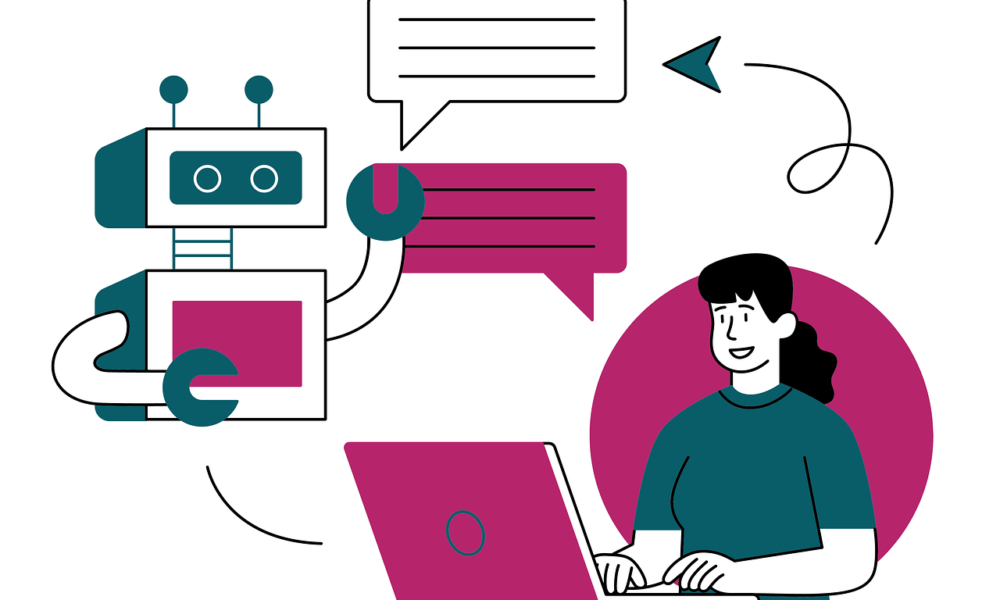How AI Chatbots Are Transforming Six Major Industries in 2025

AI chatbots employ artificial intelligence together with machine learning and NLP to interact with humans in a manner that resembles actual human conversations.
AI chatbots are now the new norm in the business landscape. Although they have been present in the market for quite some time, it was the grand entrance of ChatGPT that made these virtual companions as popular as pop stars. The current chatbots are far from the simple automated responses that one could have imagined a few years back. They have become incredibly advanced and are changing the ways organizations in healthcare, e-commerce, travel, and education perform their functions—there is no sector that remains immune to the powers of algorithms.
What’s an AI Chatbot?
AI chatbots deliver authentic human-like interactions. The modern digital smartypants employ artificial intelligence together with machine learning and NLP to interact with humans in a manner that resembles actual human conversations. The virtual conversationalists are fully present across websites and apps and messaging platforms.
For example, consider sasjoy.com. It’s changing how businesses handle calls. Its AI receptionists sound almost human. They pick up fast, answer questions, and send calls where they need to go. If things get tricky, they pass the line to a real person. It’s a sharp system—quick, smooth, and efficient. A mix of machine and human, working together. No wasted time. No lost calls. Just service done right.
AI employees maintain 24/7 availability to deliver customer service and close deals while efficiently managing operations. What’s their secret? The algorithms now process user requests with understanding that surpasses both human workers and the previous generation of computer responses.
- AI Chatbots in E-Commerce
Chatbots work like tireless shop hands. They help folks find what they need, suggest things they might like, and lead them steady through the buying trail. They don’t stop there. These bots keep an eye on the shelves, know when supplies run low, and even set things in motion to restock before anyone notices.
They don’t chatter much, but they’re quick. They give updates on orders, sort out returns, and answer questions without fuss. That keeps customers content. The big names—Amazon, Alibaba, eBay—already use them in their stores. The best app makers say this isn’t just a fad. It’s the way things are going in e-commerce now.
- Financial Services and AI Chatbots
The use of AI chatbots proves to be very beneficial for banks and money men. They accept the basic tasks—balancing, transferring, informing people about loans or cards. It leaves the real people to do the harder work to accomplish the goals that are set for them. They don’t just follow orders. These bots learn about a person and his or her spending and saving habits and dispense advice that seems tailor made.
They watch each deal as it unfolds, never sleeping. They alert others if there is something fishy. That keeps the money safe. It is not far off the day when these machines will be relied on even more by banks.
- Transforming Healthcare with AI-Powered Chatbots
Chatbots make it easy to book a doctor’s visit, send a reminder, or call it off if plans change. They ask about symptoms, listen well, and give early signs of what might be wrong. With these AI bots, folks can get help when they need it, quick and straight.
They don’t stop when the visit ends. They check in after, remind patients to take their pills, and offer help from afar. It’s steady work, and they do it without complaint. More and more, health companies are bringing these bots into their apps. The signs are clear. This isn’t a passing thing. These chatbots are here to stay—and soon, they’ll be at the heart of healthcare.
- AI Chatbots in Travel and Hospitality
The travel world is not an exception and is incorporating AI chatbots efficiently. Today, tour companies and hotels rely on smart applications based on the machine learning to perform the work. These bots assist in booking rooms, flights, and cars and have become widespread in the market. They simplify it, sanitise it and speed it up. They respond to questions, adjust plans when they happen and provide cover for irregularities that may occur.
They find out what kind of trips are preferred by the travelers and then offer them a perfect fit. That makes journeys better. Today, travel companies are looking for app developers who understand how to incorporate AI into the applications. They look at the future and they desire to have the best equipment to face it.
- AI-Powered Chatbots in Real Estate
Real estate is already leveraging on the use of chatbots. They assist people to get houses for rent by asking what they are looking for such as where, how much and what type of house. The bots respond quickly and they do not leave out any detail. For property managers, they handle inquiries, maintenance issues, and can even prod the tenants on their rent payment.
But there’s more. With AI, the game changes. It assists to introduce AR and VR, new ways to visit the place without entering. It is possible to take a tour, look around and get the impression of being in the real world. Thus, it can be seen that real estate is not just about selling space. It is employing smarter ways to explain it better and market it faster.
- AI Chatbots in Education
AI chatbots are proving their worth in education. In learning apps and online classrooms, they guide students—telling them about courses, schedules, and assignments. They answer questions, straight and fast. Teachers use them too. The bots watch how students do, then offer lessons and tools that fit just right.
They don’t stop at learning. These bots handle the small jobs—signing up, paying fees, keeping records in order. Quiet work, but important.
Now, ed-tech startups are bringing chatbots into their apps. They want to build smarter tools. Tools that help students learn more, and learn better.
Conclusion
The chatbot revolution isn’t coming. It’s already here. It opened the door, entered and settled down comfortably to make supper for everyone. They assist with flight bookings, prompting grandma to take her medicine, and performing a hundred chores without sleep. In almost every field of activity, organizations are increasingly adopting them. They don’t sleep. They don’t call in sick. They just work. It is the future and it does not stand still for anyone. It doesn’t drink coffee. It doesn’t take holidays. But it gets the job done.
FAQs
Q1: How are chatbots changing e-commerce?
They are the sales associates who do not consider it a problem to work on holidays. These bots assist customers in finding products, recommending products, managing inventory, shipping details, and returns at the comfort of their homes while you are asleep. It is for this reason that Amazon and Alibaba have them.
Q2: Are chatbots transforming healthcare delivery?
Yes, they are turning into the medical receptionists who would even know your name. Chatbots take bookings, ask about symptoms, remind about medications, and offer follow-ups, which means that the doctor’s office comes to your pocket with no waiting room magazines.
Q3: What role do chatbots play in real estate?
They are house hunting companions who do not judge your financial capacity. These bots help to match the property to the preferences, answer the tenants’ questions, deal with maintenance requests, and even provide virtual tours – the new way of property hunting that doesn’t require small talk during a viewing.
Meta description
The current AI chatbots are far from the simple automated responses that one could have imagined a few years back.

Source: How AI Chatbots Are Transforming Six Major Industries in 2025




